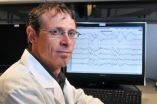(Press-News.org) ANN ARBOR, Mich. – Surviving cancer may also mean surviving pain, according to a study by the University of Michigan Health System showing 20 percent of cancer survivors at least two years post diagnosis have current cancer-related chronic pain.
The study, published online ahead of print in the American Cancer Society's journal Cancer, gives new insight on issues in cancer survivorship among the growing number of U.S. cancer survivors.
More than 40 percent of patients surveyed had experienced pain since their diagnosis, and the pain experience was worse for blacks and women.
The Lance Armstrong Foundation, an organization that examines experiences of the cancer community, sponsored the U-M survey study of nearly 200 patients.
Other findings:
The most significant source of pain was cancer surgery (53.8 percent) for whites and cancer treatment (46.2 percent) for blacks.
Women had increased pain, more pain flares, more disability due to pain, and were more depressed than men because of pain.
Blacks with pain reported higher pain severity, expressed more concern about harmful pain treatment side effects, and had greater pain-related disability.
According to the National Cancer Institute, more than 60 percent of people diagnosed with cancer will be alive in five years. As society ages, study authors say, pain complaints and cancer issues will grow as significant health concerns and health policy issues.
"All in all, the high prevalence of cancer and pain and now chronic cancer pain among these survivors, especially blacks and women, shows there's more work to be done in improving the quality of care and research," says lead study author and pain medicine specialist Carmen R. Green, M.D., professor of anesthesiology, obstetrics and gynecology and health management and policy at the University of Michigan.
Patient and physician knowledge and attitudes may lead to poor pain management, authors say. For instance, worries about side effects such as addiction or fears that pain is a sign that the cancer had gotten worse may lead patients and their doctors to minimize pain complaints.
"When necessary and appropriate there are a variety of therapies available to address pain and improve their well-being," Green says.
INFORMATION:
Green co-authored the study with U-M colleagues Tamera Hart-Johnson, M.S., and Deena R. Loeffler, M.A.
Study details: Adults, ages 18-90, who experienced breast, prostate, colorectal, or lung cancer, or multiple myeloma at least two years prior were part of the study data. Participants were recruited from the Michigan State Cancer Cancer Registry. Participants were defined as survivors from the moment of diagnosis, in accordance with the NCI and the Lance Armstrong Foundation.
Reference: "Cancer-related chronic pain: examining quality of life in diverse cancer survivors," Cancer.
Resources:
University of Michigan Department of Back and Pain Center
http://www.med.umich.edu/anes/pain/team/team.htm
University of Michigan Comprehensive Cancer Center
http://www.cancer.med.umich.edu/
Lance Armstrong Foundation
http://www.livestrong.org/What-We-Do
Cancer survivors likely to experience pain at some point in care: U-M study shows
It's considered first study to show 43 percent of racially diverse cancer survivors experienced pain since diagnosis
2011-01-14
ELSE PRESS RELEASES FROM THIS DATE:
Popular sleep medicine puts older adults at risk for falls, cognitive impairment
2011-01-14
Adults who take one of the world's most commonly prescribed sleep medications are significantly more at risk for nighttime falls and potential injury, according to a new study by the University of Colorado at Boulder.
The study, which involved 25 healthy adults, showed 58 percent of the older adults and 27 percent of the young adults who took a hypnotic, sleep-inducing drug called zolpidem showed a significant loss of balance when awakened two hours after sleep. The findings are important because falls are the leading cause of injury in older adults, and 30 percent of ...
International Planck mission peels back layers of the universe
2011-01-14
(Santa Barbara, Calif.) –– Planck –– an international satellite that peers back into the beginning of the universe –– has produced what scientists are calling new and provocative data. The satellite is a European Space Agency mission with significant contributions from NASA.
On Tuesday, the Planck mission released a new data catalog with initial maps of the entire sky. The catalog includes thousands of never-before-seen dusty cocoons where stars are forming, and some of the most massive clusters of galaxies ever observed.
"Encoded in the Planck maps is an enormous ...
Women with false-positive mammograms report high anxiety and reduced quality of life
2011-01-14
Doctors are calling for women to receive more information about the pitfalls of breast cancer screening, as well as the benefits, after some women who received false-positive results faced serious anxiety and reduced quality of life for at least a year.
A study published online by BJS, the British Journal of Surgery, shows that patients with false-positive results - where the mammogram is abnormal but no cancer is present - had to undergo more diagnostic procedures than women with breast cancer before they were given the all clear.
Researchers from The Netherlands ...
Cosmic magnifying glasses could shed light on the origin of the Universe
2011-01-14
The first gravitational lens, a phenomenon in which light from a distant object is bent around a massive foreground object, was discovered in 1979 by a team led by Dr. Dennis Walsh from The University of Manchester's Jodrell Bank Observatory.
Since then, astronomers have used gravitational lenses in many ways, including studying dark matter and as "Nature's Telescope" to investigate galaxies in the distant universe.
In a letter to the journal Nature, Professor Shude Mao of The University of Manchester, along with Stuart Wyithe (University of Melbourne), Haojing Yan ...
The microbes in our gut regulate genes that control obesity and inflammation
2011-01-14
If you are looking to lose weight in the coming year, you may need help from an unexpected place: the bacteria in your gut. That's because scientists have discovered that the bacteria living in your intestines may play a far more significant role in weight loss and gastrointestinal problems than ever imagined. In a new research report published online in The FASEB Journal (http://www.fasebj.org), researchers show that a deficiency of Toll-like receptor 2 (Tlr2)—used by mammals (including humans) to recognize resident microbes in the intestines—leads to changes in gut bacteria ...
Inventions of evolution: What gives frogs a face
2011-01-14
"Don't be a frog!" people say in jest when someone hesitates instead of acting straight away. However to be called a frog should actually be a reason to strengthen one's self-confidence. After all frogs are real winners – at least from the point of view of evolutionary biology: Nearly 6.000 species are known today. "In terms of numbers frogs are superior to all the other amphibians, and even mammals", says Professor Dr. Lennart Olsson from the Friedrich Schiller University Jena (Germany). Professor Olsson's research group for Systematic Zoology examines these animals's ...
Is 'breast only' for first 6 months best?
2011-01-14
Current guidance advising mothers in the UK to exclusively breast feed for the first six months of their baby's life is being questioned by child health experts on bmj.com today.
The authors, led by Dr Mary Fewtrell, a consultant paediatrician at the UCL Institute of Child Health in London, have reviewed the evidence behind the current guidance and say the time is right to reappraise this recommendation.
The researchers stress that while they fully back exclusive breast feeding early in life, they are concerned that exclusively doing so for six months and not introducing ...
Taking more steps every day can help ward off diabetes
2011-01-14
Simply taking more steps every day not only helps ward off obesity but also reduces the risk of diabetes, finds a study published on bmj.com today.
While several studies have shown that physical activity reduces body mass index and insulin resistance - an early stage in the development of diabetes - this is the first study to estimate the effects of long-term changes in daily step count on insulin sensitivity.
A popular guideline is to do 10,000 steps every day, though a more recent recommendation is 3,000 steps, five days a week.
The research, by the Murdoch Childrens ...
Virus might fight brain tumors better if armed with bacterial enzyme, study shows
2011-01-14
COLUMBUS, Ohio – New research shows that oncolytic viruses, which are engineered to destroy cancer cells, might be more effective in treating deadly brain tumors if equipped with an enzyme that helps them penetrate the tumor.
The enzyme, called chondroitinase, helps the cancer-killing virus clear its way through the thickets of protein molecules that fill space between cells and impede the virus's movement through the tumor, say researchers at the Ohio State University Comprehensive Cancer Center-Arthur G. James Cancer Hospital and Richard J. Solove Research Institute ...
Enzyme inhibition or removal may prevent or treat ischemic retinopathy
2011-01-14
AUGUSTA, Ga. – The inhibition or removal of an enzyme may prevent or treat ischemic retinopathy by stalling growth of unwanted vessels in the retina, Medical College of Georgia researchers say.
Ischemic retinopathy is characterized by uncontrolled formation of new blood vessels in the retina, and is seen in diseases such as diabetic retinopathy and retinopathy of prematurity. While this blood vessel formation, called neovascularization, can benefit ischemic heart disease and wound healing, it is bad in the retina, where new vessels are dysfunctional and bleed, usually ...
LAST 30 PRESS RELEASES:
Scientists show how to predict world’s deadly scorpion hotspots
ASU researchers to lead AAAS panel on water insecurity in the United States
ASU professor Anne Stone to present at AAAS Conference in Phoenix on ancient origins of modern disease
Proposals for exploring viruses and skin as the next experimental quantum frontiers share US$30,000 science award
ASU researchers showcase scalable tech solutions for older adults living alone with cognitive decline at AAAS 2026
Scientists identify smooth regional trends in fruit fly survival strategies
Antipathy toward snakes? Your parents likely talked you into that at an early age
Sylvester Cancer Tip Sheet for Feb. 2026
Online exposure to medical misinformation concentrated among older adults
Telehealth improves access to genetic services for adult survivors of childhood cancers
Outdated mortality benchmarks risk missing early signs of famine and delay recognizing mass starvation
Newly discovered bacterium converts carbon dioxide into chemicals using electricity
Flipping and reversing mini-proteins could improve disease treatment
Scientists reveal major hidden source of atmospheric nitrogen pollution in fragile lake basin
Biochar emerges as a powerful tool for soil carbon neutrality and climate mitigation
Tiny cell messengers show big promise for safer protein and gene delivery
AMS releases statement regarding the decision to rescind EPA’s 2009 Endangerment Finding
Parents’ alcohol and drug use influences their children’s consumption, research shows
Modular assembly of chiral nitrogen-bridged rings achieved by palladium-catalyzed diastereoselective and enantioselective cascade cyclization reactions
Promoting civic engagement
AMS Science Preview: Hurricane slowdown, school snow days
Deforestation in the Amazon raises the surface temperature by 3 °C during the dry season
Model more accurately maps the impact of frost on corn crops
How did humans develop sharp vision? Lab-grown retinas show likely answer
Sour grapes? Taste, experience of sour foods depends on individual consumer
At AAAS, professor Krystal Tsosie argues the future of science must be Indigenous-led
From the lab to the living room: Decoding Parkinson’s patients movements in the real world
Research advances in porous materials, as highlighted in the 2025 Nobel Prize in Chemistry
Sally C. Morton, executive vice president of ASU Knowledge Enterprise, presents a bold and practical framework for moving research from discovery to real-world impact
Biochemical parameters in patients with diabetic nephropathy versus individuals with diabetes alone, non-diabetic nephropathy, and healthy controls
[Press-News.org] Cancer survivors likely to experience pain at some point in care: U-M study showsIt's considered first study to show 43 percent of racially diverse cancer survivors experienced pain since diagnosis



